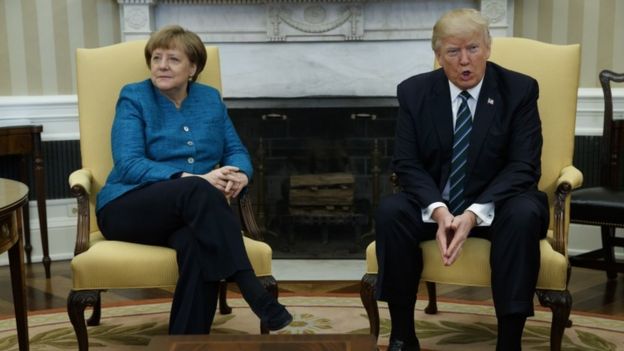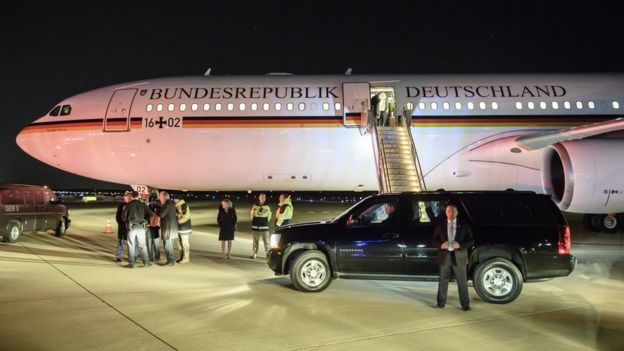
This article is more than
8 year oldNato, trade and Ukraine are high on the agenda, but the focus is also on how two leaders with hugely contrasting ideas and leadership styles interact.
Mr Trump has called Mrs Merkel's migration policy "catastrophic", while she has criticised his planned travel ban on several mainly Muslim nations.
The visit was scheduled for Tuesday but had to be postponed due to a snowstorm.
The leaders are holding more than two hours of talks, followed by a working lunch and joint press conference.
There was a warm reception as Mrs Merkel arrived, although it was a little awkward as they posed stiffly for photographs inside the White House.
Mr Trump said they had been discussing a myriad of issues, adding: "Send a good picture back to Germany, please."
The summit has been highly anticipated given that the two leaders have publicly differed on several key issues.
In January, Mr Trump said the German chancellor had made "a catastrophic mistake" by allowing hundreds of thousands of refugees and migrants into Germany.
And when Time magazine chose her as its person of the year in 2015 instead of him, Mr Trump said she was "ruining Germany". However, he has also said in the past she is a leader he greatly respects.
He also has German ancestry. His grandfather emigrated to the US in 1885 at the age of 16 from the town of Kallstadt, about 50km (30 miles) south-west of Frankfurt.
For her part Mrs Merkel has criticised President Trump's controversial travel ban that targets the citizens of several mainly Muslim countries.
In her first telephone conversation with Mr Trump after he took office, she explained that the Geneva Convention obliges signatories, including the US, to take in refugees of war on humanitarian grounds.
More on Trump and Merkel:
Mrs Merkel also had a strong relationship with Barack Obama. His final call to a foreign leader as president was said to be to Mrs Merkel, thanking her for her leadership.
BBC Berlin correspondent Jenny Hill says Mrs Merkel and Mr Trump are also two leaders with hugely different styles - he is flamboyant, impetuous and prone to rhetoric, while she is reserved, pragmatic and lingers over decisions.
Our correspondent says Angela Merkel needs to walk a diplomatic tightrope. She has to build a working relationship with Mr Trump without appearing to sacrifice her own values or disappoint those keen to cast her as the West's last defender of those democratic ideals.

This first meeting comes as she prepares for an election battle later in the year, seeking a fourth term as chancellor.
Trade is a key issue for the summit.
During his presidential campaign, Mr Trump threatened higher import taxes for countries such as Germany that have a trade surplus over America.
Mrs Merkel is being accompanied by top executives from German companies Siemens, Schaeffler and car giant BMW and will point out the large direct German investment in the US.
She said BMW's plant in the US exported "more cars than GM and Ford together" from the United States, adding: "I'll make that clear."

On Friday morning, Economy Minister Brigitte Zypries said Germany could file a suit against any hike in import duties at the World Trade Organization (WTO).
"There are procedures laid out there because in the WTO agreements it is clearly laid out that you're not allowed to take more than 2.5% taxes on imports of cars," Ms Zypries told Deutschlandfunk radio - Mr Trump has suggested a 35% levy.
"It wouldn't be the first time that Mr Trump has lost in the courts," she added.
Nato is also on the agenda.
Mr Trump has insisted members pay their fair share. Only four nations currently reach the benchmark of spending 2% of GDP on defence. Germany is not among them.
The agenda is also expected to cover foreign policy issues involving Russia, Syria, Iran, North Korea and the Middle East peace process